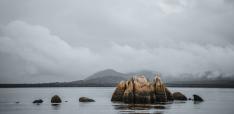The Climate Crisis: Too Much Structure, Not Enough Agency

Mark Beeson on the Gordian Knot preventing action on climate change.
We’re now a quarter of the way through the twenty-first century and it’s uncontroversial to say it’s proving to be something of a disappointment. Wars, plagues, famines, death, plus a civilisation-threatening breakdown of the natural environment - which wasn’t even included as one of the original Four Horsemen - are creating an apocalyptic-looking future.
While ‘we’ - in this case, the entire human race – are the principal actors in this story, I don’t think it’s all our fault. As Karl Marx pointed out, we’re not making history in optimal circumstances. Just surviving was quite an achievement for most of our collective history, and the threat didn’t only come from other more ‘advanced’, acquisitive or pathologically violent neighbours either.
On the contrary, the natural environment, from which we emerged and upon which we continue to depend, could be a hostile and unforgiving place. Evolution has no interest in stability. Natural selection, an enduring environmental structure if ever there was one, is an alarmingly efficient mechanism for thinning the ranks of weaker life forms less suited to the frequently brutal business of continued existence. Adapt, innovate, or die out.
Even when we gave up hunting and gathering for a settled agrarian existence, our troubles weren’t over. Marx also recognised that when humanity exploited ‘external’ nature we changed it, and it simultaneously changed us. This ‘metabolic interaction’ was the ‘everlasting nature-imposed condition of human existence’. Structural constraints don’t get much more fundamental or existential.
Structural transformations
Human development is frequently measured by rising living standards, not dying of hideous, avoidable diseases, increasing our understanding of material reality, and not fighting pointless wars with the people next-door. While we’ve undoubtedly made some progress with these - or exerted agency, if you like – giving up violence is clearly harder than it looks.
But even where we might think we’ve collectively got much to be pleased about, apparent breakthroughs for humanity often have unexpected and unwelcome consequences. Perhaps the greatest interlinked innovations that have come back to bite us were the accidental invention of capitalism and the scientific discoveries that were essential parts of the industrial revolution.
Using coal as a source of cheap energy seemed like a good idea, and when it was only Britian or even Europe doing the exploiting, it must have seemed like a blessing, especially to an emergent, newly-enriched capitalist class. Andreas Malm’s analysis of the rise of steam power in Britain argues that fossil fuels are the ‘materialisation of social relations’. Capitalism also seemed like a good idea, even if people didn’t actually call it that initially.
Economic expansion and the pursuit of profit made Britian the envy of the world, and a hegemonic imperial power to boot. None of this could have been foreseen. We are still living with the consequences of things that arguably happened to us, as much as we consciously created them.
This is not to downplay the role of avaricious capitalists in accelerating these processes, but they were taking advantage of opportunities that technological and social innovations made possible. It’s also clear in retrospect that capitalist incentive structures have shaped the behaviour of the masses, too. Perhaps no greater confirmation of this possibility can be seen than in China in the wake of Deng Xiaoping’s ‘opening up’ and de-collectivisation: there’s nothing like keeping the fruits of one’s labour lift productivity, it seems.
Is Deng an example of agency writ large? Perhaps. After all, not many people get the opportunity to inaugurate the sort of epochal change that led to the largest economic and social transformation the world has ever seen. And yet, it’s important to remember that Deng inherited both a unified country and a geopolitical order that was sympathetic to China’s move away from the Soviet Union and toward a Chinese form of capitalism. In other words, he was able to take advantage of preexisting structural conditions.
Unfortunately, China’s transformation has proved to be a little too successful, and not just in the way so many grand strategists fret about in the United States and Australia. On the contrary, the greatest threat to China’s economic miracle is the damage it has done to its own, and by extension, the world’s environment. There are simply, too many Chinese people trying to live like ‘us’, in this case the overprivileged denizens of ‘the West’. They’re not alone either: India, which now has the biggest population in the world, is not far behind, and nor are its environmental problems
The big question in the context of a still growing global population, greenhouse gas emissions that continue to rise, and capitalist economies geared to ever greater consumption-oriented production, is whether effective agency can make a difference. History is not an encouraging guide. After all, humanity’s destruction and transformation of the natural environment has already been so great that they had to invent a name for it: the Anthropocene.
Agency in the Anthropocene
The good news about the Anthropocene is that it signifies recognition and understanding on the part of climate scientists about our role as environmental vandals. Rather than being applauded for their brilliance and dedication, however, climate scientists have been studiously ignored; at least by the sorts of powerful political and economic actors who might be able to exercise some useful agency on behalf of the rest of us.
Perhaps we might have been forgiven for our clearly unsustainable behaviour when there weren’t quite so many of us and we didn’t really understand what was going on, but we don’t have that excuse now. We may not know exactly what will happen if we continue to heat up the planet, but we can be confident that it’s not going to be good. Indeed, it might be the proverbial end of civilisation as we know it.
So why aren’t we acting with the urgency that is clearly required if we - not to mention our fellow creatures who unambiguously lack agency – are to avoid an imminent and unpleasant fate?
To be fair, lots of well-intentioned people have been doing what they can: establishing environmental NGOs, encouraging governments to attend endless summits dedicated saving the planet, and much else. But the reality is that such actions have not proved sufficient to make a real impression on the drivers of climate change. This isn’t surprising when some of the potentially most important of such international gatherings are hosted by countries dependent on the continuing exploitation of fossil fuels to underpin their lavish lifestyles.
Nor is it just autocratic petrostates that are unambiguous climate villains. It embarrasses me to say so, but Australia is undoubtedly one of the worst offenders when it comes to knowingly and selfishly destroying the environment. The excuse even supposedly progressive politicians rely on is ‘if we don’t supply gas and/or coal to countries that want it, someone else will’. Possibly true, but not the most compelling excuse for the abnegation of personal or national responsibility.
Rather quixotically I have suggested that Australia is such a fortunate country that it has a moral obligation to provide an example of good international behaviour. I have absolutely no expectation that this will happen. The inability to act independently or exert agency is a function of preexisting political, economic and even ideational structures.
True, fossil fuel companies exert a powerful influence over politicians, but they don’t really need to: it is simply unimaginable that Australian policymakers – or anyone else’s, for that matter – would dream of sacrificing their ‘national interest’ on behalf of the rest of the world. The Trump administration is currently the most unabashed manifestation of this possibility, but they’re not alone.
Nor is it just the structure of the international system and its self-serving states that are to blame for the absence of climate action. Policymakers everywhere seem incapable of imagining a world in which producing ever-expanding economic growth is not their principal KPI, surpassed only by ‘keeping us safe’ at moments of crisis. Rather tellingly, leaders always seem able to find money for traditional forms of defence when required, even if that is still a second order issue compared to the looming, implacable climate catastrophe.
‘Pressure from below’ might be one possible way of waking up a global political class that seems imprisoned by inherited and unquestioned structural constraints. But transforming the global economy into something more equitable and sustainable, not to mention lowering the geopolitical temperature at the same time, is a big ask, especially for people armed with nothing but placards and good intentions. But if someone doesn’t break our socially created shackles soon, I think we know where we’re headed.
Mark Beeson, Adjunct Professor, Australia-China Relations Institute, University of Technology Sydney.
Photo by Chris F


